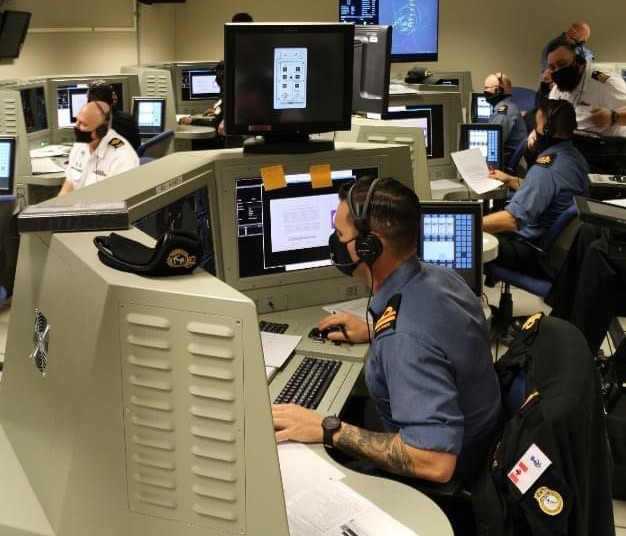The Hard Road To High Readiness During A Global Pandemic
By Lookout on Jan 29, 2021 with Comments 0

HMCS Halifax conducts warfare training in the operations room simulator at CFB Stadacona while masked and socially distanced as the ship prepared for its Operation Reassurance deployment.
LCdr Mark Fifield
SNMG1 PAO
––
COVID-19 has impacted all of us on both a personal and professional level. Institutionally, it has challenged us to adapt our training, technical, and personnel management processes in innovative ways. Preparations for HMCS Halifax’s departure on Jan.1 were no different, with the added complication of an aggressive timeline to ensure the ship was technically ready, crewed, and trained to succeed in operations.
HMCS Halifax’s team met these challenges right from the beginning, having to perform major maintenance and readiness training while under various states of provincial restrictions on movements and workforce availability. This required creative solutions to ensure the program moved forward.
“This pre-deployment period presented challenges that our team had never faced before as we had to improvise and work harder to make sure we met high readiness status prior to deploying,” said PO2 Greg Cousineau, Halifax Operations Room Supervisor. “It’s not only the motivation and hard work that our sailors put in that allowed us to exceed expectations, but also the families at home who supported us and enabled us to perform to the level that we did.”
Whether it was leveraging technology to hold training from sailors’ homes to isolating on board while alongside to conduct training that would normally be held at one of the schools, the Halifax team and Maritime Forces Atlantic support services worked tirelessly to successfully achieve all of the milestones toward the ship reaching the highest state of readiness.
Similarly, technical authorities and staff from the Fleet Maintenance Facility Cape Scott had to work through strict precautions, sometimes limiting the amount of simultaneous work that was required, to ensure all mechanical and combat systems were in the best shape possible for a long deployment.
Throughout all of the preparations and at-sea periods leading up to the deployment, the health and safety of the crew and all outside support remained paramount.
Prior to proceeding to sea for workups and the eventual deployment, the crew were put under strict quarantine requirements to reduce the risk of infection making it on board once the ship was at sea. The support of shipmates from other fleet units during these periods was invaluable and demonstrated the team spirit inherent in today’s Royal Canadian Navy.
“We have reached this point through the positive attitude, imagination, ingenuity, and perseverance from our entire team of military and civilians here in Maritime Forces Atlantic,” said Cdr Chris Rochon, Halifax’s Commanding Officer. “Support from fleet and formation staffs, other ship’s companies, the technical teams at our Fleet Maintenance Facility, the Personnel Coordination Center, the evaluators and mentors from sea training and our fleet school, and the base support services was critical.”
These combined efforts enabled the RCN training system to continue to generate well trained and equipped, globally deployable high-readiness naval forces that remain “Ready to Help, Ready to Lead and Ready to Fight” on behalf of Canadians.
––––
Filed Under: Top Stories
About the Author:





